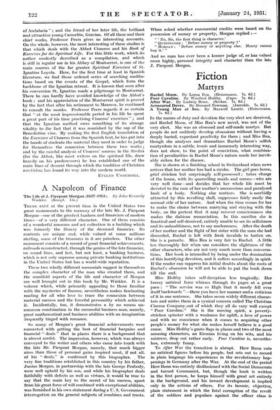A Napoleon of Finance
The Life of J. Pierpont Morgan (1837-1913). By John Kennedy Winkler. (Knopf. 15s.) THERE exist at the present time .in the United States two great monuments to the memory of the late Mr. J. Pierpont Morgan—one of the greatest bankers and financiers of modern times—of a very different character. One of them consists of a wonderful museum and art collection in a building which was formerly the library of the deceased financier. Its contents are unique and, while valued at some millions sterling, some of the treasures in it are priceless. The other monument consists of a record of great financial achievements, railroads reconstructed, through the genius of the late financier, on sound lines, and last, but not least, a banking business, which is not only supreme among private banking institutions in the United States but has a world-wide reputation.
These two wholly different memorials suggest in themselves the complex character of the man who created them, and the manifold aspects of the life and character of Morgan are well brought out in this book by Mr. Winkler. It is a volume which, while primarily appealing to those familiar with the mysteries of finance, nevertheless makes fascinating reading for all who love to trace the connexion between material success and the forceful personality which achieved it. Incidentally, too, it demonstrates a by no means un- common combination in the successful business man, namely, great mathematical and business abilities with an imagination frequently tinged with romance.
So many of Morgan's great financial achievements were connected with getting the best of financial bargains and financial " deals " that in places there is a background that is almost sordid. The impression, however, which was always conveyed to the writer and others who came into touch with the late Mr. Pierpont Morgan, namely, that much bigger aims than those of personal gains inspired most, if not all, of his " deals," is confirmed by this biographer. The very fine traditions established in this country by his father, Junius Morgan, in partnership with the late George Peabody, were well upheld by his son, and while his biographer deals faithfully with defects as well as virtues, it would be true to say that the main key to the secret of his success, apart from his great force of will combined with exceptional abilities, was fitrnished in his own statement during a U. 8, Government interrogation on the general subjects of combines and trusts. When asked whether commercial credits were based on the possession of money or property, Morgan replied :— " ' No, Sir, the first thing is character.' " QUESTIONER : Before money or property ? ' " Moacten Before money or anything else. Money cannot buy it.' " And no man has ever been a keener judge of, or has valued more highly, personal integrity and character than the late J. Pierpont Morgan.






































 Previous page
Previous page